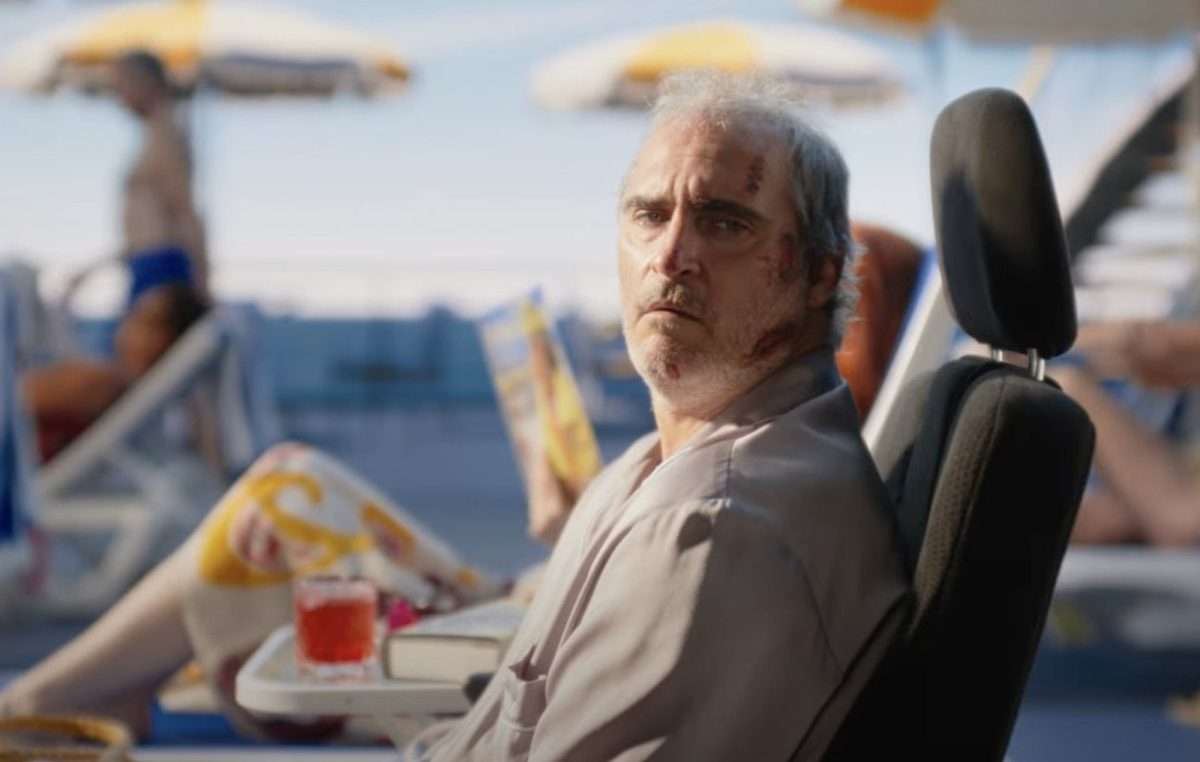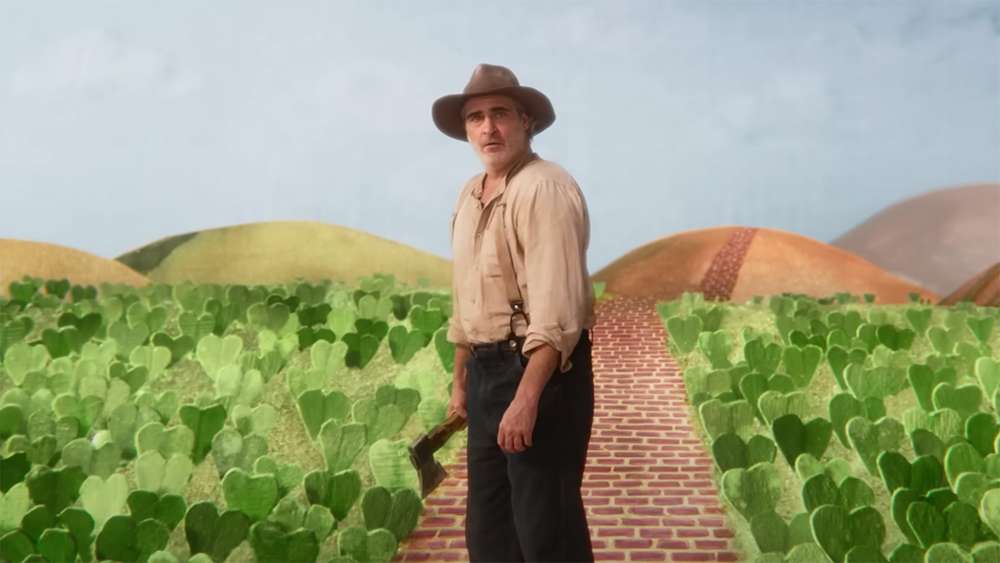
It can sometimes seem that the only foolproof way to tell the difference between a nightmare and real life is that you keep waking up to the latter. Beau Is Afraid, Ari Aster’s third feature, quickly disabuses us of this distinction. It’s an epic, nearly three-hour odyssey into the mind of an anxious manchild, Beau Wasserman, played to neurotic, stuttering perfection by Joaquin Phoenix. Beau is a paunchy middle-aged man living in the kind of crime-ridden metropolis that only exists in a Republican’s fantasy of liberal dystopia: the streets are alive with a minefield of prostitutes, panhandlers, heroin addicts, trigger-happy police. Then there’s a man who might be the most tattooed person in the world hanging out alongside a naked man who likes to stab people. Beau ventures out of his apartment to see his gently-beaming therapist (Stephen McKinley Henderson), who prescribes him pills and asks Beau how he’s feeling about an upcoming trip to visit his mother.
Drawing upon a long Hitchcockian theme of overbearing mothers, this film upgrades the mother character into the role of main antagonist, an overbearing Oedipal baddie. Beau ends up missing his flight because someone (we never find out who) steals his key from his front door, which means he has to call and suggest to his mother, in his fumbling, soft-voiced way, that maybe their visit be postponed. The next day, his mother Mona is found dead in her home, her head crushed by a falling chandelier. Beau’s subconscious nightmare, and perhaps his wish, has come to pass.
Mona is a prominent and wealthy businesswoman, played in present by a matriarchal Patti LuPone and in flashbacks by a mesmerizingly witchy Zoe Lister-Jones. By turns tender and others cruel, she has always been the most significant relationship in Beau’s life, the one who he calls when his credit card is declined at the local Cheapo Depot. Lister-Jones is shown with a young Beau played by Armen Nahapetian, a particularly inspired bit of casting, as Nahapetian looks exactly like I’d imagine Phoenix did at that age.
The middle portion of the film is devoted to two surreal and tangential chapters that on the surface appear to diverge from the core of the story, but which have to do with familial pain and the longing to belong somewhere in the world. In the first, Beau stays with a family whose son was killed in action, and who has invited their son’s PTSD suffering brother-in-arms Jeeves (Denis Ménochet) to stay with them.
Parents Grace (Amy Ryan) and Roger (Nathan Lane), underneath their uncanny perkiness, are still deeply grieving the loss of their son, to the point of emotionally neglecting their daughter Toni (Kylie Rogers), who looks like a Disney Channel star but behaves like a teenage Tasmanian devil. Beau later flees to the forest, where he meets a troupe of theater misfits who happen to be putting on a play about Beau’s future. In an extended animation sequence (directed by Cristóbal León and Joaquín Cociña) we watch the life of Beau as legend, from present time to the future. His life will be full of troubles, but at least in this version, there’s no mention of his mother.
The film hasn’t done well at the box office, which is perhaps to be expected. Unlike Aster’s first two films Hereditary and Midsommar, which belong unquestionably in the horror pantheon, Beau Is Afraid is a little bit of everything, like anxiety run wild. There are acutely funny moments and conceits, as there always are in Aster’s films–a giant Jabba-the-Hut-esque penis living in his mother’s attic is a notable example. But sometimes, seeing helpless Beau being traumatized over and over would make something in my chest tug painfully. In flashbacks, we see Mona telling Beau that his father died on the eve of his conception due to a genetic heart condition that is poetically triggered by his first experience of la petite mort, thereby blaming her son for the loss of her life partner. When Beau finally has sex for the first time ever with his long-lost love interest Elaine, played in childhood by Julia Antonelli and in adulthood by Parker Posey, she dies immediately following orgasm. The film approaches trauma in a way I’ve never seen before, by showing how anxiety is born from our childhood trauma and continues to grow up and out, weaving its way like a snake through one’s subjective experience of life, rearing its head everywhere you look. Isn’t the world as objectively chaotic and frightening as our subjective experience leads us to believe? Beau thinks he’s going to die because he swallowed his anti-anxiety pills without water. But then his credit card doesn’t work, his mother doesn’t answer her phone, there’s a brown recluse spider loose in the apartment and, later, a traumatized veteran on the loose with a loaded machine gun. Beau is shot at, stabbed, and forced into a drug trip from hell by two sadistic teens. As a child, his relationship with his mother was emotionally incestuous; now, she wants him to die. As an audience, we can interpret the events of the film as either real or unreal, but they always ring true–both as a character study for Beau, and as a sociological work of art.
The film is impressive, though there are parts where one feels that the record is stuck. At 2 hours and 59 minutes, it’s indulgently long, and if the plot sometimes gives you the feeling that Aster was playing a game of exquisite corpse with himself. A Styxian journey at the end leads Beau to his worst moment yet, one of final judgment. The end is of course not a happy one, but it’s not unhappy either. It’s simply a relief, which is perfect for a horror movie. Oftentimes the worst is first to come.






